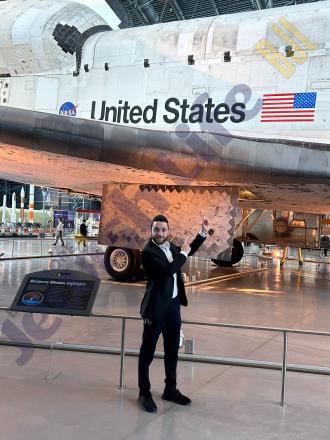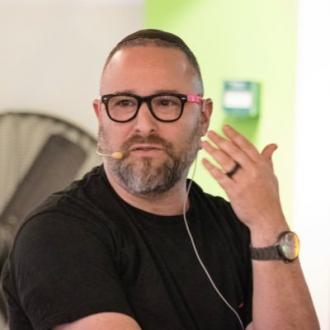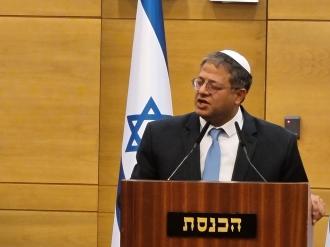President Reuven (Ruvi) Rivlin today, 18 October / 9 Cheshvan 5779, took part in the launch of an initiative to strengthen the human capital in the Haredi and Arab sectors, led by a new coaltion of NGOs, technology companies, government ministries and philanthropists, under the leadership of Start-Up Nation Central. The event was held at the offices of Mobileye in Jerusalem.
The program aims to bridge the serious lack of skilled technology workers in Israel, particularly in Jerusalem, first with female haredi computer science graduates and men and women from the Arab sector, who are almost totally unrepresented in the Israeli hi-tech sector.
Professor Eugene Kandel, CEO of Start-Up Nation Central, Professor Amnon Shashua, CEO of Mobileye and SVP of Intel, representatives from Ex Libris, 40Nuggets, Litghtricks and other companies also participated in the event.
President Rivlin participated as part of the launch of ‘Israeli Hope’, his flagship program to encourage greater civility and partnership between the four major ‘tribes’ of Israeli society – secular, religious, ultra-orthodox and Arab. The program works in key social and economic areas: education, academia, employment, sport and others. ‘Israeli Hope’ aims to strengthen the ‘together’ of Israeli society by respecting each of the groups it comprises, with the aim of ensuring the strength and success of the State of Israel as a Jewish and democratic state. In the field of employment, ‘Israeli Hope’ is working to bring the haredi and Arab sectors into appropriate work places in the public and private sectors by creating partnerships and initiatives with large companies and government ministries, as well as encouraging existing initiatives and processes.
According to figures released by Start-Up Nation Central, which works to strengthen the Israeli hi-tech sector, there is insufficient growth in the workforce to satisfy growing demand. The industry also suffers from under-representation in entire sectors of the population: the haredi population makes up only 2% of the workforce in the sector, and the Arab population only 3%. According to a recent survey supported by the JP Morgan Chase Foundation, there are 15,000 unfilled positions in Israeli hi-tech.
In the framework of the program, an initial group has been chosen of haredi women and Israeli-Arab men and women with degrees in computer science or other relevant fields. This group will receive technical training, experience in problem-solving, exposure to the industry, help in building skills and support in finding relevant work opportunities in different technology companies. Jerusalem is an ideal test case for this program, since 37% of the population is Arab and 24% are haredi.
The program will train some 200 candidates over three years, but the main aim is to create an appropriate track with proven results that will become a government program that will train a thousand haredi women and Arab men and women by the year 2023.
President Rivlin spoke of the challenges of living in a diverse society, saying “If we face the problems together, I believe we can live here together - people from Jerusalem and Hurfeish, from Mea Shearim and Rehavia. Everybody should be able to live their life in the way they choose, but we also have to understand that we are all together and we have to take care of each other.” He added, “whether we are Jews, Moslems or Christians, here we are all Jerusalemites, we are all Israelis. The 'Israeli hope' is that everyone can find a way to live and to succeed together. If we can bridge the gaps between us, it sends a very strong message to the region that the gap between Israelis and Palestinians can also be bridged.”
Prof. Eugene Kandel, CEO of Start-Up Nation Central said “We, as a country, cannot afford to have people who have been or can be trained, and aspire to work in the sector, being sidelined because their potential is not recognized. There are many obstacles, which are hard for any individual to overcome, but we, as a coalition, are working to remove every one of them.” He added that Start-Up Nation Central would report to Pres. Rivlin once a year on the program’s progress.
Professor Amnon Shashua, CEO of Mobileye and SVP at Intel, told the participants of the challenges facing hi-tech companies who look for high-quality workers from the haredi and Arab sectors: “There are plenty of candidates with great potential that is not being unlocked today. I believe with all my heart that we can bridge the gap between the skills they have and the needs of the hi-tech companies. That’s why we are proud to be part of this program, since this is our aim.” He also said “with this coalition of leading Israeli companies, I have no doubt that the program will answer the need for high-quality workers, and we will continue to support the integration of under-represented sectors of society in the industry. 10% of Mobileye’s employees are haredi or Arab right now, and that’s just the beginning.”
At the end of the meeting, President Rivlin went down to Mobileye’s parking garage to see the self-driving vehicle, accompanied by Amnon Shashua, who showed the president the various systems, the safety mechanisms that allow it to drive and went for a short drive together. The president called Shauli, his driver for the last 20 years, to join them for the ride and at the end said, “but don’t go looking for another job, Shauli. I don’t go anywhere without you.”

















